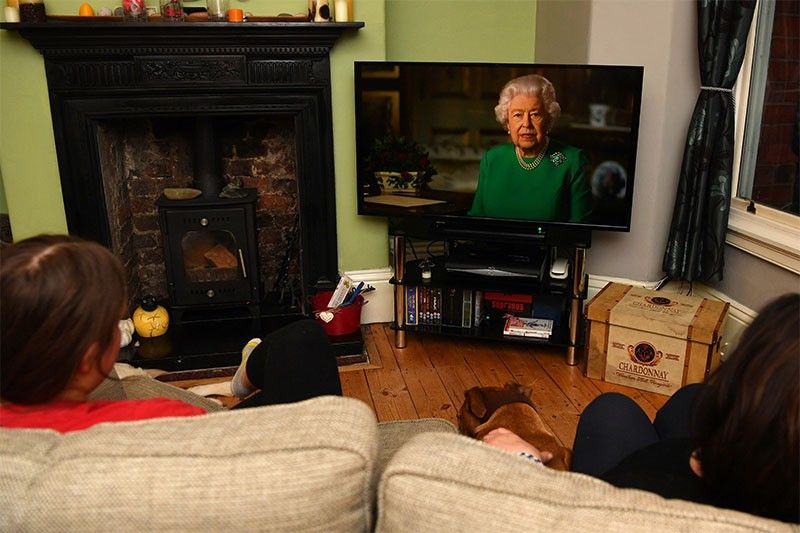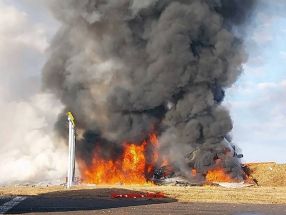UK PM in hospital as queen says united effort will defeat virus

LONDON, United Kingdom — British Prime Minister Boris Johnson was taken to hospital on Sunday after failing to shake off coronavirus symptoms, as Queen Elizabeth II said a united effort would defeat the outbreak.
The government announced within an hour of the monarch's rare special address to the country and Commonwealth nations that Johnson had been admitted for further tests as a precaution.
Johnson, 55, had been due to re-emerge from seven days of self-isolation on Friday, a week after announcing he had tested positive for COVID-19 and had mild symptoms.
But he said in a video message on Friday that he would continue to stay at home because of a persistent high temperature.
Downing Street called it a "precautionary step" and it is understood his admission was not an emergency and he was taken to hospital on medical advice.
When he announced his positive test, his spokesman said Foreign Secretary Dominic Raab would take charge if the prime minister was unable to perform his duties.
But government sources said Johnson was still in charge.
Johnson is the most high-profile world leader to contract the virus. His pregnant partner, Carrie Symonds, is also recovering from symptoms but has not been tested.
Health Secretary Matt Hancock returned to work on Friday after a week at home following his positive test for COVID-19. The chief medical officer, Chris Whitty, has also displayed symptoms.
Hancock on Sunday described Johnson's condition as "OK" and said he had been in "good spirits".
"He's very much got his hand on the tiller," he told Sky News television but said Johnson was being careful to follow government advice on self-isolation.
Speaking from the White House, US President Donald Trump said he was "hopeful and sure" Johnson would recover, calling the prime minister "a friend of mine" and "great leader."
'We'll meet again'
The Downing Street announcement came as the 93-year-old queen offered a message of hope to everyone affected by the global pandemic, which has seen more than 1.2 million cases and more than 68,000 deaths.
Britain currently has 47,806 confirmed hospital cases and 4,934 deaths. The monarch's eldest son, heir to the throne Prince Charles, has tested positive after displaying mild symptoms.
In only her fourth address at a time of crisis in her 68-year reign, the queen said the outbreak could be defeated by a collective effort in a "common endeavour".
"We will succeed — and that success will belong to every one of us," she said in a speech recorded at Windsor Castle, west of London, where she moved as a precaution on March 19.
Thanking healthcare staff and keyworkers, and praising the community response to the outbreak, the queen said people in Britain and around the world could feel proud.
"Together we are tackling this disease, and I want to reassure you that if we remain united and resolute, then we will overcome it," she added.
She drew on her experience of World War II, when she and her sister princess Margaret were evacuated to Windsor as London was bombed, drawing parallels with people forced apart by the virus.
In particular, she referenced British wartime singer Vera Lynn, whose song "We'll Meet Again" became an anthem for service personnel fighting abroad, far from their loved ones.
"We should take comfort that while we may have more still to endure, better days will return: we will be with our friends again; we will be with our families again; we will meet again."
Tougher measures
Johnson was criticised for his initial light-touch approach to the outbreak but on March 23 ordered a three-week lockdown after scientists warned the approach risked huge numbers of deaths.
Non-essential shops and services have now been shut for the last two weeks and gatherings of more than two people banned to try to cut close-contact transmission and reduce infection rates.
People have been told only to leave their homes to shop for essential items and medicine, and to exercise.
But Hancock on Sunday warned that outside exercise could be banned after concern warmer weather could tempt people from their homes to public parks and open spaces.
A major south London park was closed on Sunday after high numbers of sunbathers on Saturday.
Hancock later said changes to social distancing were "not imminent" but in a sign of the seriousness of the measures, Scotland's chief medical officer resigned for breaking the rules.
Catherine Calderwood caused outrage in Scotland for twice visiting her second home north of Edinburgh, despite fronting an ad campaign calling for Scots to stay at home.
She apologised and Scotland's First Minister Nicola Sturgeon backed her to stay on. But on Sunday night Calderwood said she had quit as her behaviour risked "becoming a distraction".
Follow this page for updates on a mysterious pneumonia outbreak that has struck dozens of people in China.
New Zealand Prime Minister Chris Hipkins says on Sunday that he had contracted COVID-19, testing positive at a key point in his flailing campaign for re-election.
Hipkins saYS on his official social media feed that he would need to isolate for up to five days -- less than two weeks before his country's general election.
The leader of the centre-left Labour Party said he started to experience cold symptoms on Saturday and had cancelled most of his weekend engagements. — AFP
The World Health Organization and US health authorities say Friday they are closely monitoring a new variant of COVID-19, although the potential impact of BA.2.86 is currently unknown.
The WHO classified the new variant as one under surveillance "due to the large number (more than 30) of spike gene mutations it carries", it wrote in a bulletin about the pandemic late Thursday.
So far, the variant has only been detected in Israel, Denmark and the United States. — AFP
The World Health Organization says on Friday that the number of new COVID-19 cases reported worldwide rose by 80% in the last month, days after designating a new "variant of interest".
The WHO declared in May that Covid is no longer a global health emergency, but has warned that the virus will continue to circulate and mutate, causing occasional spikes in infections, hospitalisations and deaths.
In its weekly update, the UN agency said that nations reported nearly 1.5 million new cases from July 10 to August 6, an 80% increase compared to the previous 28 days. — AFP
The head of US intelligence says that there was no evidence that the COVID-19 virus was created in the Chinese government's Wuhan research lab.
In a declassified report, the Office of the Director of National Intelligence (ODNI) says they had no information backing recent claims that three scientists at the lab were some of the very first infected with COVID-19 and may have created the virus themselves.
Drawing on intelligence collected by various member agencies of the US intelligence community (IC), the ODNI report says some scientists at the Wuhan lab had done genetic engineering of coronaviruses similar to COVID-19. — AFP
Boris Johnson deliberately misled MPs over Covid lockdown-breaking parties in Downing Street when he was prime minister, a UK parliament committee ruled on Thursday.
The cross-party Privileges Committee said Johnson, 58, would have been suspended as an MP for 90 days for "repeated contempts (of parliament) and for seeking to undermine the parliamentary process".
But he avoided any formal sanction by his peers in the House of Commons by resigning as an MP last week.
In his resignation statement last Friday, Johnson pre-empted publication of the committee's conclusions, claiming a political stitch-up, even though the body has a majority from his own party.
He was unrepentant again on Thursday, accusing the committee of being "anti-democratic... to bring about what is intended to be the final knife-thrust in a protracted political assassination".
Calling it "beneath contempt", he said it was "for the people of this to decide who sits in parliament, not Harriet Harman", the veteran opposition Labour MP who chaired the seven-person committee. — AFP
- Latest
- Trending


































